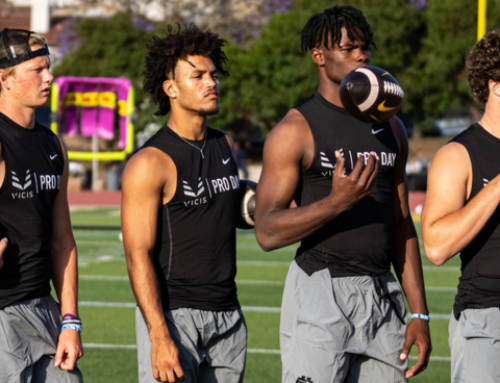How the Military Can Help You Pay for School and Play Sports at the Same Time

Photo via Argonauts.ca
Nobody would give Robert McCune a scholarship.
In high school, McCune had been a standout two-sport athlete, but he made the common mistake of focusing more on sports than academics. His grades slipped too much for him to be considered for a scholarship.
But instead of giving up on playing football at the next level, McCune found another way to pay his tuition.
“My sister and dad had military backgrounds, and they told me about how the Army could help pay for school,” McCune said.
He decided to enlist in the Army immediately after high school. “For me, the military was a great choice because I didn’t have the discipline that I needed before I enlisted.”
After serving in both Kuwait and Korea, McCune switched to the National Guard and enrolled at the University of Louisville, where he walked on to the football team. He eventually became a starter and was drafted by the Washington Redskins.
Read about McCune’s path to professional football.
If you’re bummed about not earning a full ride to your target school, McCune’s journey suggests an interesting alternative. The military can pay your school bill while allowing you to play sports and serve your country.
How It Works
Upon enlisting, you become eligible for a number of programs that help pay for school, such as the Montgomery G.I. Bill, Post-9/11 G.I. Bill and federal tuition assistance. Some branches also offer their own incentives. For example, members of the National Guard can apply for additional benefits from their states as well as the Army National Guard Kicker, which helps pay for living expenses.
If you decide the military is your best option, you’ll need to choose whether you want to serve on active duty before college, after college or part-time while you attend college. If, like McCune, you decide to start serving right after high school, your education benefits will be waiting for you when you’re ready to use them.
If you want to go to school first, Reserve Officers’ Training Corps (ROTC) programs will help pay for college while training you to become an officer after graduation.
The National Guard offers the unique opportunity of serving while going to school; it requires a minimum of one weekend a month and two weeks a year for training. This schedule can sometimes be tough for athletes trying to balance games, practices and their National Guard duties, but McCune says the sacrifice was worth it.
“The National Guard was great,” McCune said. “It paid for college while allowing me to pursue my dream of playing college football at the same time.”
Read more:
RECOMMENDED FOR YOU
MOST POPULAR
How the Military Can Help You Pay for School and Play Sports at the Same Time

Photo via Argonauts.ca
Nobody would give Robert McCune a scholarship.
In high school, McCune had been a standout two-sport athlete, but he made the common mistake of focusing more on sports than academics. His grades slipped too much for him to be considered for a scholarship.
But instead of giving up on playing football at the next level, McCune found another way to pay his tuition.
“My sister and dad had military backgrounds, and they told me about how the Army could help pay for school,” McCune said.
He decided to enlist in the Army immediately after high school. “For me, the military was a great choice because I didn’t have the discipline that I needed before I enlisted.”
After serving in both Kuwait and Korea, McCune switched to the National Guard and enrolled at the University of Louisville, where he walked on to the football team. He eventually became a starter and was drafted by the Washington Redskins.
Read about McCune’s path to professional football.
If you’re bummed about not earning a full ride to your target school, McCune’s journey suggests an interesting alternative. The military can pay your school bill while allowing you to play sports and serve your country.
How It Works
Upon enlisting, you become eligible for a number of programs that help pay for school, such as the Montgomery G.I. Bill, Post-9/11 G.I. Bill and federal tuition assistance. Some branches also offer their own incentives. For example, members of the National Guard can apply for additional benefits from their states as well as the Army National Guard Kicker, which helps pay for living expenses.
If you decide the military is your best option, you’ll need to choose whether you want to serve on active duty before college, after college or part-time while you attend college. If, like McCune, you decide to start serving right after high school, your education benefits will be waiting for you when you’re ready to use them.
If you want to go to school first, Reserve Officers’ Training Corps (ROTC) programs will help pay for college while training you to become an officer after graduation.
The National Guard offers the unique opportunity of serving while going to school; it requires a minimum of one weekend a month and two weeks a year for training. This schedule can sometimes be tough for athletes trying to balance games, practices and their National Guard duties, but McCune says the sacrifice was worth it.
“The National Guard was great,” McCune said. “It paid for college while allowing me to pursue my dream of playing college football at the same time.”
Read more:










